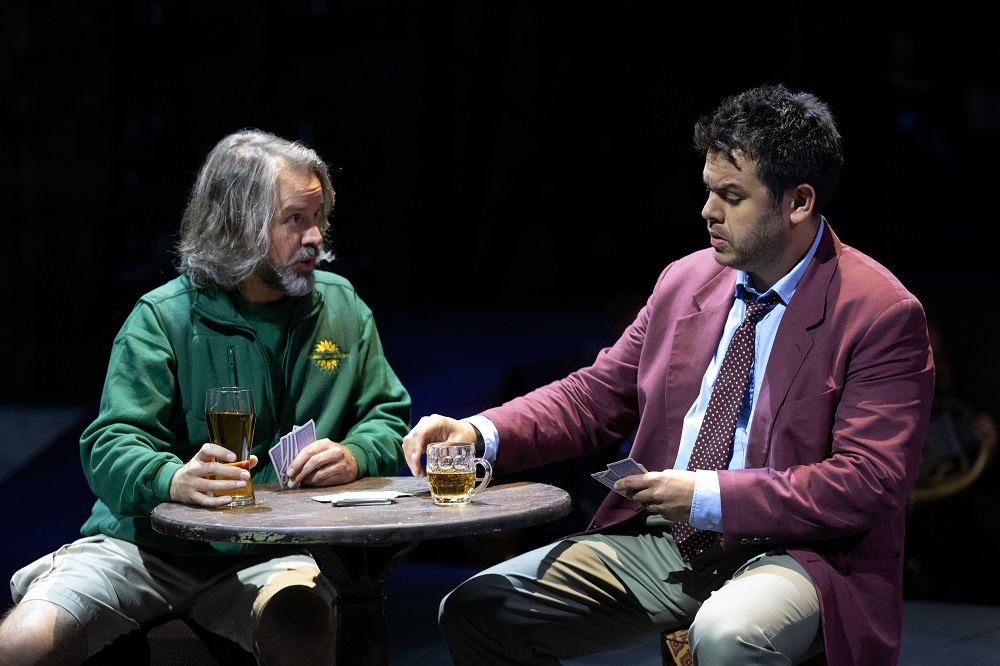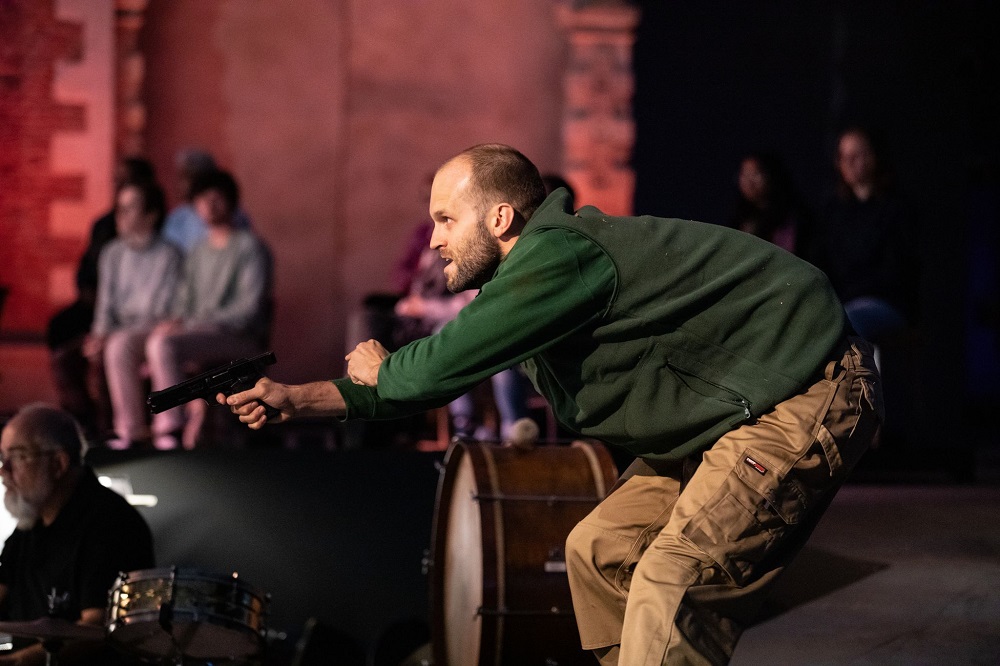The Cunning Little Vixen, Opera Holland Park review - imagine the forest, enjoy the music-making | reviews, news & interviews
The Cunning Little Vixen, Opera Holland Park review - imagine the forest, enjoy the music-making
The Cunning Little Vixen, Opera Holland Park review - imagine the forest, enjoy the music-making
Conductor Jessica Cottis, Jennifer France's Vixen and Julia Sporsén's Fox shine

Gorgeous woodland romp, a tale of a vivacious, independent-minded young lady-into-fox objectified by three ageing, disillusioned men or a parable of natural regeneration? The different levels of Janáček’s one-off fantasy, from strip-cartoon origins to wise philosophy, are hard to hold in balance.
Chief among them are Jennifer France and Julia Sporsén, who for me gave the music-theatre performances of the year back in 2018, when Strauss’s Ariadne auf Naxos came to Opera Holland Park. France is irrepressible as Vixen Sharpears, exuding radiant energy even when she’s not given enough to do (as in the luminous interlude of the heroine’s awakening as a young woman). The voices are only really allowed to blossom when Fox Goldenmane comes a-courting: the hesitations of the Zerbinetta-Composer relationship as director Antony McDonald saw it in the Strauss return in a deliciously different context. Fine, incidentally, that the Fox tells his object of desire that he’s from Forest Hill; but isn’t it a bit naff to play on Pret bags of food as rabbit substitute, or for the Forester to announce that he’d be able to sleep if it weren’t for the peacocks, when Janáček is giving us the buzzing of the flies the libretto cites in the orchestra?  At any rate, Grant Doyle sings his noble epilogue about the passing of time and the meaning of life with total security, and seven years on from playing the Forester in Daniel Slater’s brilliant production for Garsington, he’s also won the right to meditate on ageing. His drinking companions here may still be in the prime of life, but John Savournin as the Greek-quoting Priest manages to move us with little introduction as he reflects on his way home from the pub, and Charne Rochford’s Schoolmaster (pictured above on the right with Doyle) shows us the tenor is ready to be promoted to lead roles.
At any rate, Grant Doyle sings his noble epilogue about the passing of time and the meaning of life with total security, and seven years on from playing the Forester in Daniel Slater’s brilliant production for Garsington, he’s also won the right to meditate on ageing. His drinking companions here may still be in the prime of life, but John Savournin as the Greek-quoting Priest manages to move us with little introduction as he reflects on his way home from the pub, and Charne Rochford’s Schoolmaster (pictured above on the right with Doyle) shows us the tenor is ready to be promoted to lead roles.
It’s a nice touch in this first inn scene – strictly for adults, though it moves fast enough here for any children not to get bored - to have France as Terynka sitting at another table, leaving in annoyance at the men’s sexist meditations. Production-wise, that’s about it in terms of perception. The opera-ballet dimensions of the work go for nothing, though a choreographer is listed. For the forest creatures, we get the usual kids in animal masks waving things – though they do it well, and sing spiritedly as fox cubs in Act Three – and the only real sense of danger in the woods comes from Ashley Riches as Harasta the Poacher, a ringing and vivid portrayal of a born destroyer (pictured below).  When attention isn’t riveted on him or France and Sporsén, you tend to watch Cottis and the orchestra. Jonathan Dove’s chamber reduction of Janáček’s score is an absolute beauty; the colourings of the original are already more filigree than in the composer’s earlier Katya Kabanova, so you don’t miss full warmth of violins as much as I did in Katya at Glyndebourne. This nonet of strings projects superbly; even just two violas playing the aggressive repeated figure at the beginning of the third act manage to sound like six. With the orchestra, as in Wonderful Town, in a sunken space right at the heart of things, a narrow acting space around it, Cottis is very watchful of the singers behind her, gives ideal space to the big emotional moments and manages Janáček’s tricky tempo changes well. The brass are more than usually exposed in the reduction, and there were some audible splits and fluffs on the first night, but it’s a tough score which asks much from the players in difficult registers. The main thing is that the sounds move us as they must, even if the visuals remain short on point.
When attention isn’t riveted on him or France and Sporsén, you tend to watch Cottis and the orchestra. Jonathan Dove’s chamber reduction of Janáček’s score is an absolute beauty; the colourings of the original are already more filigree than in the composer’s earlier Katya Kabanova, so you don’t miss full warmth of violins as much as I did in Katya at Glyndebourne. This nonet of strings projects superbly; even just two violas playing the aggressive repeated figure at the beginning of the third act manage to sound like six. With the orchestra, as in Wonderful Town, in a sunken space right at the heart of things, a narrow acting space around it, Cottis is very watchful of the singers behind her, gives ideal space to the big emotional moments and manages Janáček’s tricky tempo changes well. The brass are more than usually exposed in the reduction, and there were some audible splits and fluffs on the first night, but it’s a tough score which asks much from the players in difficult registers. The main thing is that the sounds move us as they must, even if the visuals remain short on point.
The future of Arts Journalism
You can stop theartsdesk.com closing!
We urgently need financing to survive. Our fundraising drive has thus far raised £49,000 but we need to reach £100,000 or we will be forced to close. Please contribute here: https://gofund.me/c3f6033d
And if you can forward this information to anyone who might assist, we’d be grateful.

Subscribe to theartsdesk.com
Thank you for continuing to read our work on theartsdesk.com. For unlimited access to every article in its entirety, including our archive of more than 15,000 pieces, we're asking for £5 per month or £40 per year. We feel it's a very good deal, and hope you do too.
To take a subscription now simply click here.
And if you're looking for that extra gift for a friend or family member, why not treat them to a theartsdesk.com gift subscription?
more Opera
 La bohème, Opera North review - still young at 32
Love and separation, ecstasy and heartbreak, in masterfully updated Puccini
La bohème, Opera North review - still young at 32
Love and separation, ecstasy and heartbreak, in masterfully updated Puccini
 Albert Herring, English National Opera review - a great comedy with depths fully realised
Britten’s delight was never made for the Coliseum, but it works on its first outing there
Albert Herring, English National Opera review - a great comedy with depths fully realised
Britten’s delight was never made for the Coliseum, but it works on its first outing there
 Carmen, English National Opera review - not quite dangerous
Hopes for Niamh O’Sullivan only partly fulfilled, though much good singing throughout
Carmen, English National Opera review - not quite dangerous
Hopes for Niamh O’Sullivan only partly fulfilled, though much good singing throughout
 Giustino, Linbury Theatre review - a stylish account of a slight opera
Gods, mortals and monsters do battle in Handel's charming drama
Giustino, Linbury Theatre review - a stylish account of a slight opera
Gods, mortals and monsters do battle in Handel's charming drama
 Susanna, Opera North review - hybrid staging of a Handel oratorio
Dance and signing complement outstanding singing in a story of virtue rewarded
Susanna, Opera North review - hybrid staging of a Handel oratorio
Dance and signing complement outstanding singing in a story of virtue rewarded
 Ariodante, Opéra Garnier, Paris review - a blast of Baroque beauty
A near-perfect night at the opera
Ariodante, Opéra Garnier, Paris review - a blast of Baroque beauty
A near-perfect night at the opera
 Cinderella/La Cenerentola, English National Opera review - the truth behind the tinsel
Appealing performances cut through hyperactive stagecraft
Cinderella/La Cenerentola, English National Opera review - the truth behind the tinsel
Appealing performances cut through hyperactive stagecraft
 Tosca, Royal Opera review - Ailyn Pérez steps in as the most vivid of divas
Jakub Hrůša’s multicoloured Puccini last night found a soprano to match
Tosca, Royal Opera review - Ailyn Pérez steps in as the most vivid of divas
Jakub Hrůša’s multicoloured Puccini last night found a soprano to match
 Tosca, Welsh National Opera review - a great company reduced to brilliance
The old warhorse made special by the basics
Tosca, Welsh National Opera review - a great company reduced to brilliance
The old warhorse made special by the basics
 BBC Proms: The Marriage of Figaro, Glyndebourne Festival review - merriment and menace
Strong Proms transfer for a robust and affecting show
BBC Proms: The Marriage of Figaro, Glyndebourne Festival review - merriment and menace
Strong Proms transfer for a robust and affecting show
 BBC Proms: Suor Angelica, LSO, Pappano review - earthly passion, heavenly grief
A Sister to remember blesses Puccini's convent tragedy
BBC Proms: Suor Angelica, LSO, Pappano review - earthly passion, heavenly grief
A Sister to remember blesses Puccini's convent tragedy
 Orpheus and Eurydice, Opera Queensland/SCO, Edinburgh International Festival 2025 review - dazzling, but distracting
Eye-popping acrobatics don’t always assist in Gluck’s quest for operatic truth
Orpheus and Eurydice, Opera Queensland/SCO, Edinburgh International Festival 2025 review - dazzling, but distracting
Eye-popping acrobatics don’t always assist in Gluck’s quest for operatic truth

Add comment